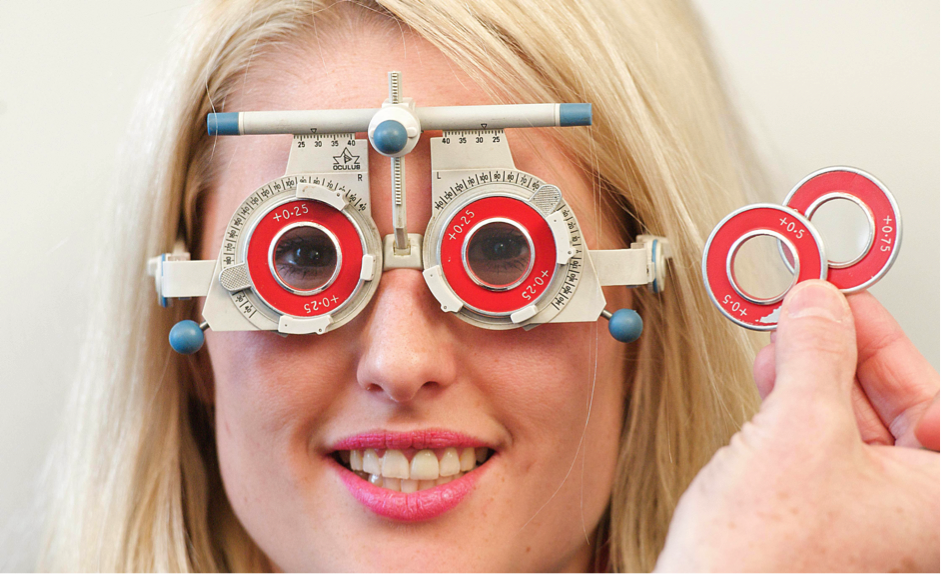Our eye examinations are far more than just a simple test of your eyes' efficiency
They are a thorough investigation of your eyes to determine how well you see
Eye disorders early enough to prevent serious damage. When you come to see us for an eye examination, please bring any glasses you currently use. If you normally wear contact lenses and have booked an eye examination or contact lens check, please come in wearing your contact lenses. If new to the practice and you wear contact lenses, please make a note of the solution you use to clean them. Please also bring an empty packet or box from your lenses so we can record the specifications.
Also, please bring a list of any current medication you have been prescribed, or eye drops you use. The repeat prescription slip you get from your GP is ideal for this.

What to expect in an eye examination
We begin the eye examination by establishing the reason for the visit. This may be routine, or could have been prompted by a specific concern. We will ask questions about your eyes and vision, ocular history, general health, medications, family history, occupation and hobbies.
Next, we measure the level of vision in each eye. We assess the binocular vision status (how well the eyes work together). We use an ophthalmoscope or slit-lamp bio-microscope to examine the health of the eyes internally and externally, to check for any abnormalities. These tests are sometimes able to detect signs of underlying general health conditions such as diabetes or hypertension.
The examination will establish whether an optical appliance, such as glasses or contact lenses, is required to correct the vision at specific distances. This is usually done by asking you to view letters on a chart through different lenses. Other methods can be used to establish an accurate optical prescription in patients who are unable to respond, such as very young children.
At the end of the sight test, the optometrists will explain the results of the sight test. They will tell you whether there is any need for corrective lenses, and issue a prescription or refer the patient to a medical practitioner if required.
Additional tests
Other tests may be performed as necessary, for example tonometry, to check the intraocular pressure inside the eye, measure visual fields (peripheral vision), colour vision assessment, OCT (a 3D scan of the optic disc and macula), or to check stereoscopic vision.
Conditions that can be detected during an eye examination
Cataracts - this is where the lens of the eye becomes cloudy with age.
Glaucoma - where the pressure in the eye causes damage to the optic nerve.
Macula degeneration - where the photoreceptors in the retina are unable to regenerate leaving blind spots in the central vision.
Myopia - shortsighted, spectacles are required to correct distance vision
Hypermetropia - longsighted, spectacles required to reduce eyestrain at near and sometimes in the distance
Astigmatism - Usually caused by an irregular curvature of the front surface of the eye
Presbyopia - progressive difficulty in reading close as the lens of the eye becomes more rigid, usually occurs after the age of 40.
NHS Eye Test & Entitlement
You will be entitled to a free NHS sight test if you meet any of the following criteria:
- Are aged 60 or over.
- If you are aged 40 or over and with a parent, sister, brother with Glaucoma.
- Registered severely sight-impaired/blind or sight-impaired/partially sighted.
- Suffering from Diabetes.
- Suffering from Glaucoma.
- Considered to be at risk from Glaucoma as advised by an ophthalmologist.
You can get a free NHS sight test and an optical voucher for glasses if:
- If you are aged under 16.
- Aged 16, 17 or 18 and in full-time education.
- Receiving income support or your partner (including civil partner).
- Receive, or you're under the age of 20 and the dependent of someone receiving Income-based, Jobseeker’s Allowance (not contribution based).
- Require complex lenses.
- Your partner (including civil partner) receive, or you're under the age of 20 and the dependent of someone receiving Pension Credit/Guarantee Credit.
- If your partner (including civil partner) receive, or you're under the age of 20 and the dependent of someone receiving Income based Employment and Support Allowance.
- If your partner (including civil partner) receive, or you're under the age of 20 and the dependent of someone receiving: Universal Credit and meet the criteria.
- A prisoner on leave from prison.
If you're entitled to or named on:
- A valid NHS tax credit exemption certificate – if you don't have a certificate, you can show your award notice. You qualify if you get Child Tax Credits, Working Tax Credits with a disability element (or both) and have income for tax credit purposes of £15,276 or less.
- Named on a valid HC2 certificate. People named on a valid HC3 certificate may also get some help.

